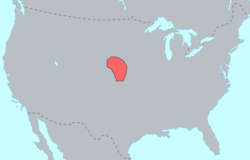Lingua pawnee
| Pawnee | ||
|---|---|---|
| Falado en: | ||
| Rexións: | Oklahoma norte e central | |
| Total de falantes: | 10 (2007) | |
| Familia: | Caddo Caddo do norte Pawnee–Kitsai Linguas pawnee Pawnee | |
| Códigos de lingua | ||
| ISO 639-1: | --
| |
| ISO 639-2: | --- | |
| ISO 639-3: | paw
| |
| Mapa | ||

| ||
| Status | ||
 | ||
A lingua pawnee é unha lingua caddo falada polos pawnee que residen na rexión norte e central de Oklahoma. As terras tradicionais do pobo onde se falaba a lingua eran o río Platte no que hoxe é Nebrasca.
Dialectos
[editar | editar a fonte]Existen dous dialectos do pawnee: South Band e Skiri. As diferenzas entre os dous dialectos están na fonética e no léxico.
Status da lingua
[editar | editar a fonte]Outrora a lingua habitual entre os pawnee, hoxe é falado por un pequeno grupo de anciáns. Por mor do proceso de susbtitución lingüística en favor do inglés como primeira lingua, o status do pawnee tende cara a extinción. Porén, no 2007 a Nación Pawnee desenvolveu materiais de ensino para o instituto local e tamén para clases para adultos. Ademais, tamén existe material documental da lingua arquivado no Instituro de Investigación de Estudos Nativo Americanos.[2] A lingua pawnee aparece no filme de 2015 The Revenant.[3] En 2019 e 2020, a Nación Pawnee publicou varios vídeos sobre o ensino da lingua pawnee.[4]
Notas
[editar | editar a fonte]- ↑ Moseley, Christopher e Nicolas, Alexandre. "Atlas of the world's languages in danger". unesdoc.unesco.org. Consultado o 11 de xullo de 2022.
- ↑ ethnologue.com (ed.). "A lingua pawnee en Ethnologue". Consultado o 9 de xullo de 2021.
- ↑ nolanb@indiana.edu, Bethany Nolan. "IU linguists provide Arikara and Pawnee dialogue for Oscar-nominated film 'The Revenant'". Inside IU Bloomington (en inglés). Consultado o 24 de xullo de 2019.
- ↑ "Pawnee Language Classes - YouTube". www.youtube.com. Consultado o 30 de outubro de 2020.
Véxase tamén
[editar | editar a fonte]| Vexa a proba da Wikipedia en Lingua pawnee |
Bibliografía
[editar | editar a fonte]- American Indian Studies Research Institute. (2008). Dictionary Database: Pawnee (Skiri and Southband dialects).
- American Indian Studies Research Institute. (2001). Pawnee Alphabet Book.
- Mithun, Marianne. (1999). The languages of Native North America. Cambridge: Cambridge University Press. ISBN 0-521-23228-7 (hbk); ISBN 0-521-29875-X.
- Parks, Douglas R. (1976). A grammar of Pawnee. Nova York: Garland.
- Taylor, Allan R. (1978). [Revisión de A grammar of Pawnee por D. Parks]. Language, 54 (4), 969-972.
Ligazóns externas
[editar | editar a fonte]- Pawnee Language Program, patrocinado pola Nación Pawnee e a Universidade de Indiana
Text is available under the CC BY-SA 4.0 license; additional terms may apply.
Images, videos and audio are available under their respective licenses.
